The landscape of managing commercial properties is more complex and high-stakes than ever in 2025. Owners and investors face rising expectations, rapid technology adoption, and a web of new regulations that make navigating this space increasingly challenging.
As a result, demand for commercial property management companies has surged. These firms are now essential partners, offering expertise to maximize ROI, ensure regulatory compliance, and streamline day-to-day operations. The right management company can be the difference between steady growth and costly missteps.
In this article, we’ll introduce the top 7 commercial property management companies for 2025. You’ll discover how each firm’s services, strengths, and specialties make them the best fit for different property portfolios.
The Evolving Landscape of Commercial Property Management in 2025
The world of commercial property management companies is undergoing a profound transformation in 2025. As market dynamics shift rapidly, property owners and investors face new complexities and opportunities that demand agility and deep industry knowledge.
Key Industry Trends and Shifts
Commercial property management companies are at the forefront of adopting new technologies. Proptech and automation are streamlining everything from maintenance scheduling to tenant communications. This digital revolution is not just about efficiency; it enables real-time reporting and data-driven strategies that help owners make informed decisions.
Sustainability is another defining trend. In response to stricter regulations and tenant expectations, many commercial property management companies are prioritizing green building management and energy efficiency. Flexible lease strategies are also on the rise, reflecting the growing demand for hybrid workspaces and adaptable office environments.
Smaller and mid-sized investors now have greater access to third-party management services, breaking down barriers that once favored only large institutional players. Meanwhile, regulatory changes continue to impact lease structures and tenant rights, requiring companies to stay agile and compliant.
Finally, the balance between global and regional firms shapes the market. Global players offer scale and consistency, while regional specialists provide tailored solutions. For a deeper dive into these shifts, explore the 2025 Property Management Industry Trends.
Challenges and Opportunities for Owners and Investors
Owners and investors working with commercial property management companies in 2025 encounter both obstacles and advantages. Rising operational costs make it challenging to maintain high tenant satisfaction, especially as expectations for amenities and technology rise.
Navigating compliance is more complex than ever. New legal frameworks demand proactive risk management and diligent reporting. At the same time, property owners see opportunities for value-add improvements, such as enhanced tenant experiences and innovative amenities.
Leveraging the expertise of commercial property management companies can drive higher occupancy rates and boost rental income. Many firms use advanced analytics to identify cost-saving measures and optimize building performance. For example, top firms have helped clients weather recent market disruptions by quickly adapting leasing strategies and enhancing digital tenant services.
Ultimately, success depends on choosing partners who align with your portfolio’s needs and can turn challenges into growth opportunities.
Essential Criteria for Choosing a Commercial Property Management Company
Selecting the right commercial property management companies is a crucial decision for any property owner or investor. The market in 2025 offers a diverse array of service providers, making it more important than ever to evaluate partners based on expertise, transparency, and alignment with your portfolio goals.
What to Look For in a Management Partner
When assessing commercial property management companies, start by considering their portfolio specialization. Does the company excel in office, retail, industrial, or mixed-use properties? This expertise ensures they understand the nuances of your asset type.
Next, review their technology platforms and reporting capabilities. The best commercial property management companies provide transparent, real-time insights through advanced dashboards and secure portals. These tools enable efficient communication and simplify financial oversight.
Service scope is another key factor. Look for companies offering comprehensive solutions, including:
- Leasing and tenant screening
- Maintenance and vendor management
- Financial reporting and rent collection
- Compliance and risk mitigation
Reputation matters, too. Explore client testimonials and industry awards as indicators of reliability and quality. For a deeper dive into real-world performance, you can browse client testimonials for property managers to see how leading commercial property management companies are rated by their customers.
Fee structures vary widely. Some firms charge a flat fee, while others use a percentage-based model. Clarify what’s included in the price to avoid surprises. Also, consider the company’s geographic coverage—do they support local, national, or global assets? Finally, assess customer service: responsive, knowledgeable support is a must for long-term satisfaction.
Evaluating Performance and Value
Performance metrics are essential when comparing commercial property management companies. Look at occupancy rates, tenant retention, net operating income (NOI) growth, and cost savings to gauge a firm’s effectiveness.
Customization and scalability are equally important. The top commercial property management companies offer tailored service packages that adapt as your portfolio grows. Here’s a sample comparison table to illustrate how leading firms might differ:
| Criteria | Firm A | Firm B | Firm C |
|---|---|---|---|
| Occupancy Rate | 96% | 93% | 95% |
| Tenant Retention | 89% | 85% | 91% |
| Technology Platform | Advanced | Basic | Advanced |
| Service Customization | High | Medium | High |
Aligning the management style with your ownership goals and property type is critical. Some commercial property management companies prioritize tenant engagement and amenities, while others focus on operational efficiency or sustainability.
Ultimately, selecting among commercial property management companies is about finding a partner whose strengths match your needs, whose performance is backed by data, and whose service model supports your growth ambitions.
7 Leading Commercial Property Management Companies for 2025
Navigating the landscape of commercial property management companies in 2025 requires a keen eye for innovation, service breadth, and proven expertise. As the demand for professional management rises, property owners and investors are turning to firms that not only deliver operational excellence but also embrace cutting-edge technology and sustainability.
Many of the top commercial property management companies are leveraging advanced PropTech to streamline operations and enhance tenant experiences. For deeper insights into how technology is reshaping the industry, you can explore this PropTech Revolution in Real Estate resource.
To help you make an informed choice, we’ve compared seven industry leaders. Each excels in unique ways, serving diverse property portfolios and investor needs.
Commercial Property Management Companies Comparison Table
| Company | Sq. Ft. Managed | Core Services | Tech Integration | Target Portfolio | Global Presence | Sample Strength |
|---|---|---|---|---|---|---|
| CBRE | 7B+ | Full suite | Advanced AI | Institutional, REITs | Global | AI-driven maintenance |
| Lincoln Property Co. | 300M+ | Office, industrial, mixed-use | Leasing tech | U.S.-focused, developers | U.S. | Adaptive reuse expertise |
| JLL | 2.7B+ | Office, industrial, retail | Analytics, ESG | Corporate, institutional | Global | Green Leasing initiatives |
| Newmark | 205M+ | Specialized/niche assets | IoT reporting | Data centers, niche assets | Regional | IoT preventative maintenance |
| Cushman & Wakefield | 4.8B+ | Office, retail, multifamily | Tenant portals | End-to-end solutions | Global | Tech-enabled tenant engagement |
| SVN International | 57M+ | Full CRE, mixed-use | Local platforms | Mid-market, local focus | Global | Franchise local expertise |
| HSA Commercial | 16M+ | Retail, office, industrial | Custom tech | Midwest, U.S. national | Regional | Medical office management |
This table offers a snapshot, but let’s dive into what distinguishes these commercial property management companies in detail.
CBRE
CBRE stands as a global powerhouse among commercial property management companies. Managing over 7 billion square feet, CBRE delivers an end-to-end suite covering leasing, sales, project, and facilities management.
Their scale enables unmatched access to advanced PropTech, market data, and seamless global consistency. Institutional investors, REITs, and multinational owners benefit from CBRE’s robust resources and innovation pipeline.
Pros:
- Comprehensive service menu
- Industry-leading technology (AI-driven maintenance)
- Deep market intelligence
Cons:
- Premium pricing
- Less personalized for smaller portfolios
Example:
CBRE’s integration of AI-powered maintenance solutions has generated measurable cost savings for clients, optimizing operational spend and asset longevity. Pricing is customized based on portfolio size and services selected.
Choosing CBRE means partnering with one of the most recognized commercial property management companies worldwide.
Lincoln Property Company
Lincoln Property Company is a top contender among commercial property management companies, especially for those focused on office, industrial, and mixed-use assets. With 300+ million square feet under management, Lincoln blends management and development expertise, particularly in the U.S. Sun Belt.

The company’s flexible service offerings and high YoY growth (17%) appeal to owners seeking both property management and development insights. Lincoln’s regional expertise and hands-on approach set them apart.
Pros:
- Innovative leasing strategies
- Adaptive reuse project success
- Strong regional presence
Cons:
- Less suitable for portfolios outside the U.S.
Example:
Lincoln’s adaptive reuse projects have revitalized underperforming properties, increasing value for investors. Their pricing model is typically a percentage of rent, varying by property type and location.
For U.S.-based portfolios, Lincoln offers a specialized approach among commercial property management companies.
JLL (Jones Lang LaSalle)
JLL is a global leader among commercial property management companies, with 2.7+ billion square feet managed and a strong focus on office, industrial, and retail sectors. Their advanced analytics and sustainability services have contributed to a 33.5% growth in managed portfolios.
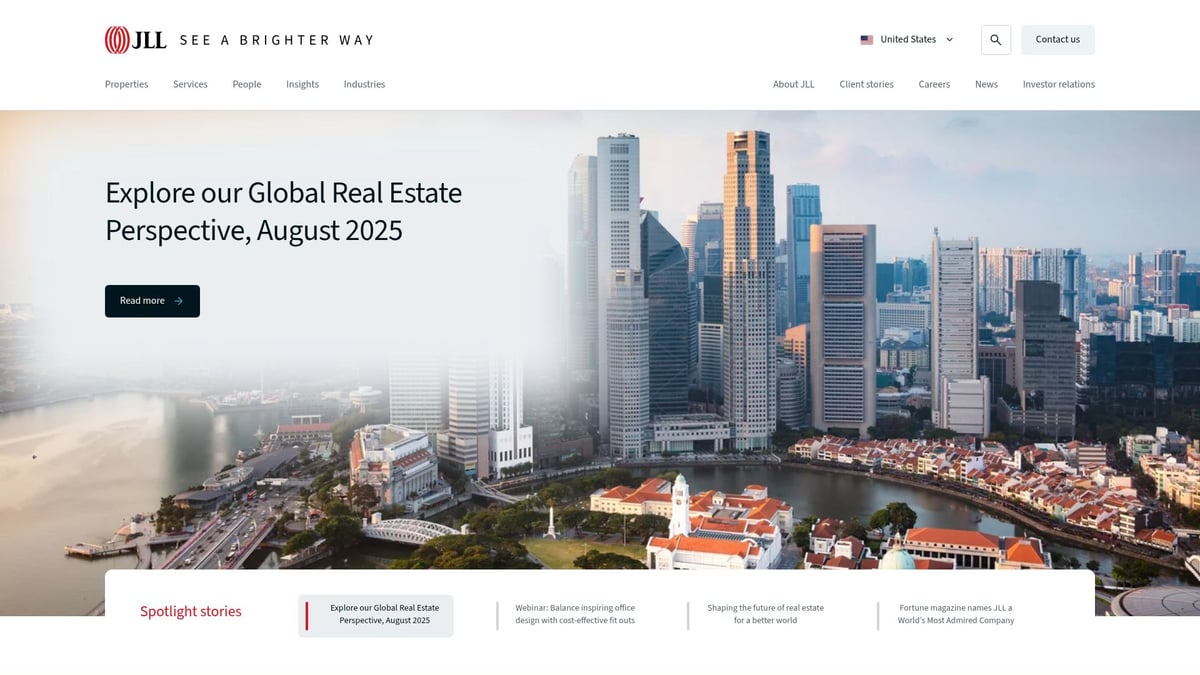
JLL’s clients include corporate owners, institutional investors, and those prioritizing ESG outcomes. Their Green Leasing initiatives help clients achieve energy savings and compliance with evolving standards.
Pros:
- Deep analytics and reporting
- Global reach
- Strong tenant engagement programs
Cons:
- Scale may limit customization for smaller assets
Example:
JLL’s Green Leasing programs have delivered significant energy cost reductions for clients. Pricing is custom and often bundled with other real estate services, making JLL a versatile choice among commercial property management companies.
Newmark
Newmark offers specialized expertise among commercial property management companies, managing over 205 million square feet. Their platform covers full-service management, including data centers and niche asset classes.
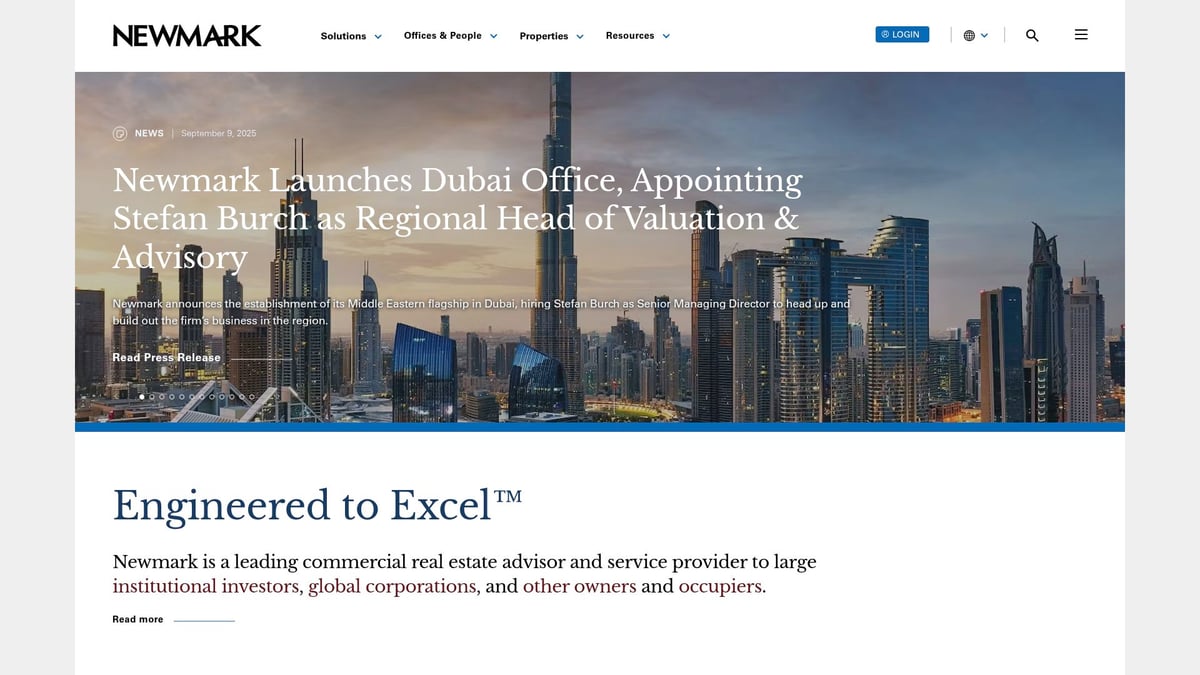
With 12% YoY growth, Newmark stands out for tech-driven reporting and capital markets integration. Owners with diverse or specialized portfolios find value in their tailored asset strategies.
Pros:
- Strong technology stack
- Capital markets integration
- Focused asset management
Cons:
- Smaller international footprint
Example:
Newmark’s use of IoT for preventative maintenance has improved operational efficiency and asset value. Their pricing is typically percentage-based and scalable to portfolio size.
Newmark is ideal for those seeking commercial property management companies with niche asset expertise.
Cushman & Wakefield
Cushman & Wakefield is a global force among commercial property management companies, overseeing 4.8+ billion square feet. Their strengths span office, industrial, retail, and multifamily assets.
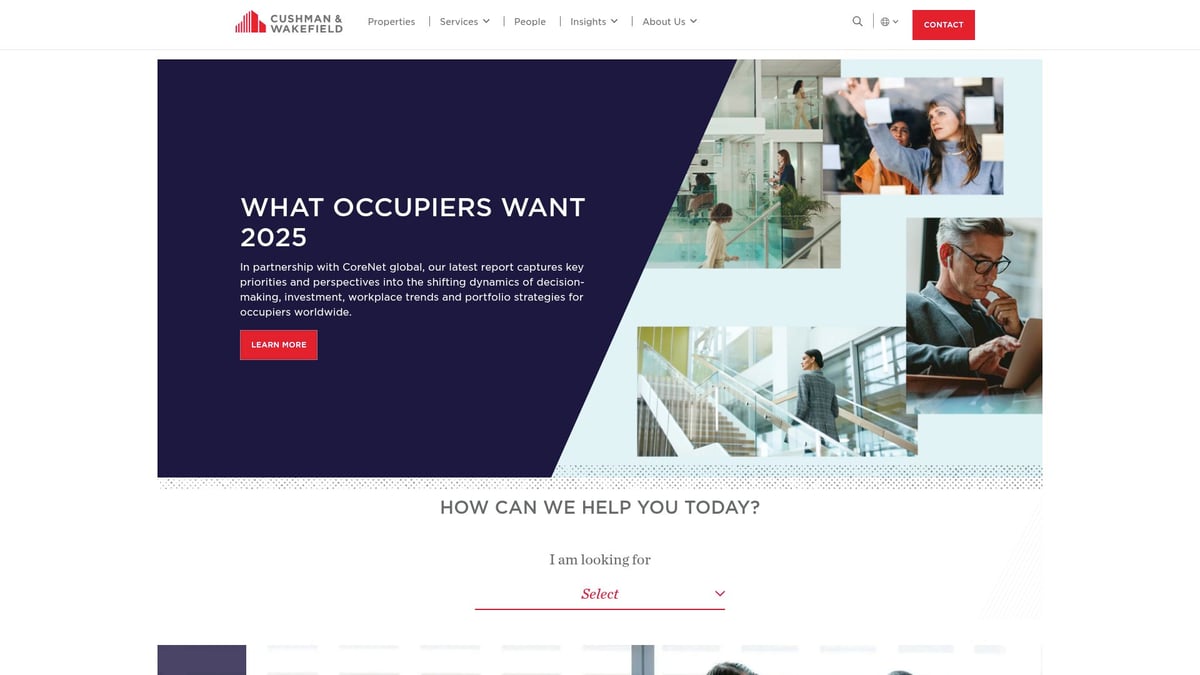
The company’s tenant experience programs and advanced facility management practices appeal to owners seeking comprehensive solutions. Cushman’s global best practices and innovation in tenant engagement are key differentiators.
Pros:
- Global presence
- Multifamily management expertise
- Tech-enabled tenant portals
Cons:
- May be costlier for smaller properties
Example:
Cushman’s technology-driven service portals have improved tenant satisfaction and retention rates. Pricing is tailored to the service bundle and property type, positioning Cushman as a leader among commercial property management companies.
SVN International
SVN International is a collaborative, full-service firm among commercial property management companies, managing over 57 million square feet across 200+ offices globally. Their franchise model ensures strong local market knowledge and personal service.
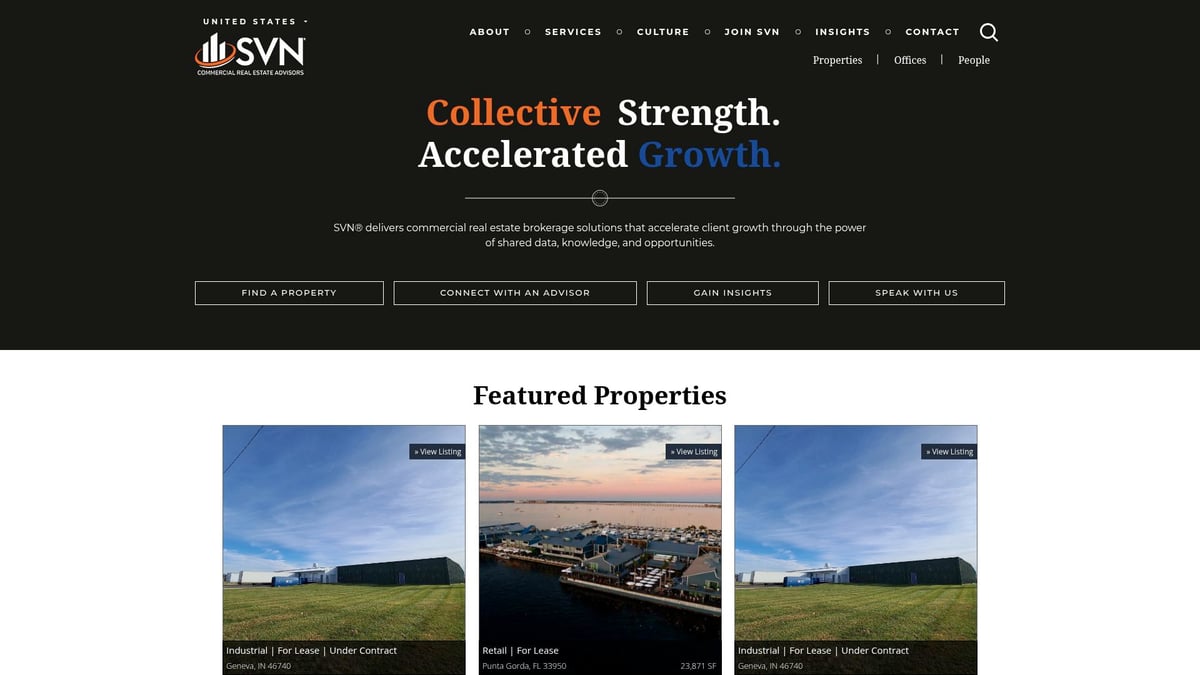
Mid-market investors and owners seeking a blend of national reach and local expertise gravitate toward SVN. The company’s competitive pricing and diverse property experience are notable advantages.
Pros:
- Local market knowledge
- Competitive pricing
- Diverse property management experience
Cons:
- Smaller scale compared to global giants
- Service consistency may vary by office
Example:
SVN’s management of mixed-use urban portfolios has delivered strong occupancy and NOI growth. Their pricing is competitive, often with lower minimums than larger commercial property management companies.
HSA Commercial Real Estate
HSA Commercial Real Estate rounds out our list of leading commercial property management companies, with 16+ million square feet managed. Their focus on retail, office, industrial, and medical facilities appeals to owners seeking high-touch service and development integration.
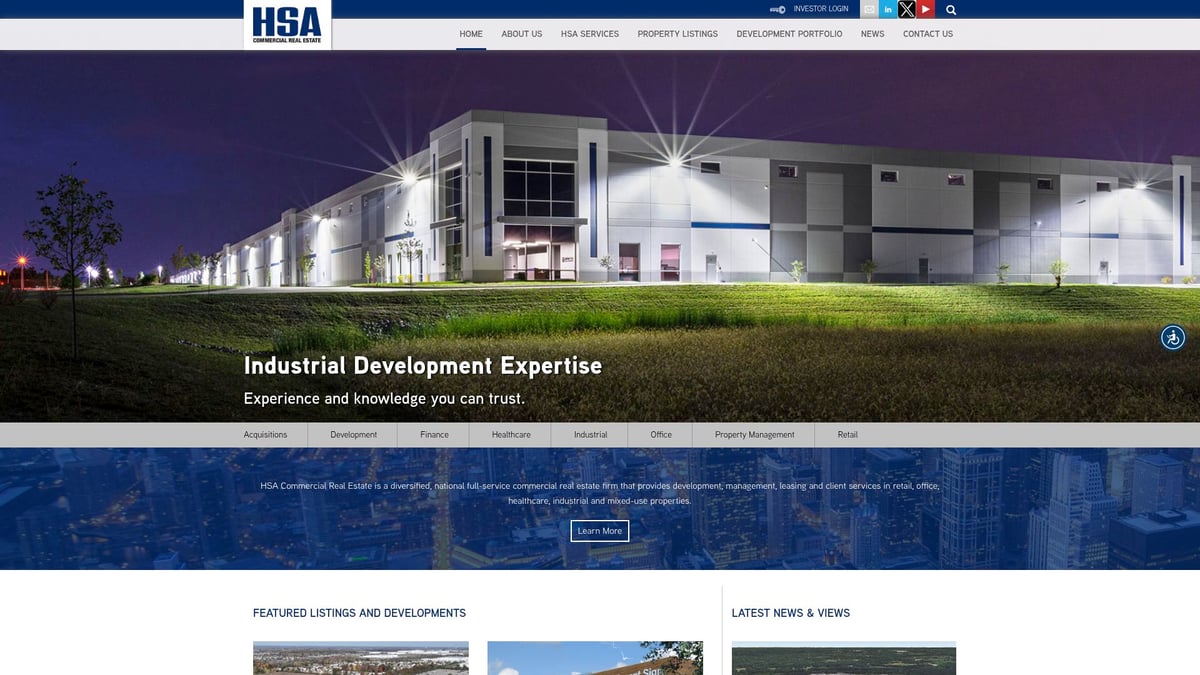
With a strong Midwest and U.S. national presence, HSA’s developer-manager hybrid model fosters flexible, customized solutions.
Pros:
- Deep development expertise
- Flexible management services
- Strong medical office building programs
Cons:
- Regional focus, less global coverage
Example:
HSA’s medical office management programs have set new standards for tenant satisfaction and operational efficiency. Pricing is typically a percentage of rent or a flat fee, depending on property type.
HSA is a strong regional choice among commercial property management companies offering integrated service.
Selecting the right commercial property management companies in 2025 is about aligning your asset goals with a partner’s expertise, technology, and track record. Each of these seven firms brings unique strengths to the table, ensuring property owners and investors can maximize returns, streamline operations, and stay ahead in a changing market.
Commercial Property Management Services: What’s Included?
Understanding the full scope of services offered by commercial property management companies is essential for property owners and investors. These companies provide a range of solutions that go far beyond simple rent collection. A comprehensive service package can directly impact tenant satisfaction, property value, and overall investment performance.
Standard and Specialized Service Offerings
Commercial property management companies typically deliver a suite of standard services tailored to the needs of each asset. These include:
- Leasing and marketing: Attracting quality tenants through targeted campaigns, professional listings, and tenant screening.
- Rent collection and financial management: Streamlining billing, handling accounts receivable, and producing detailed financial reports for transparency.
- Maintenance and repairs: Coordinating preventative maintenance schedules, managing vendors, and overseeing emergency repairs to ensure operational continuity.
- Compliance and risk management: Staying ahead of legal, insurance, and safety requirements to protect owners from liabilities.
- Tenant relations and retention: Providing 24/7 support, facilitating dispute resolution, and implementing tenant engagement initiatives to boost retention rates.
- Technology integration: Leveraging online portals, mobile apps, and smart building systems for efficient communication and operations.
- Specialized services: Offering sustainability consulting, capital improvements, and redevelopment advisory for properties with unique requirements.
Many leading commercial property management companies also provide customizable service packages that adapt as portfolios grow or tenant needs change. For a deeper dive into these offerings, you can explore a property management services overview to understand how firms structure their solutions.
Choosing the right mix of core and specialized services is crucial for maximizing asset performance and ensuring long-term success.
Example: Comparison of service menus from CBRE, JLL, and Cushman & Wakefield
Comparing service menus among top commercial property management companies reveals both similarities and critical differences. Below is a summary table highlighting key offerings from CBRE, JLL, and Cushman & Wakefield:
| Service Area | CBRE | JLL | Cushman & Wakefield |
|---|---|---|---|
| Leasing & Marketing | ✓ | ✓ | ✓ |
| Financial Management | ✓ | ✓ | ✓ |
| Maintenance & Repairs | AI-driven | Predictive analytics | Tech-enabled portals |
| Compliance & Risk | Global compliance | ESG leadership | Regulatory expertise |
| Tenant Relations | 24/7 support | Tenant engagement | Tenant experience apps |
| Technology Integration | Proptech platform | Advanced analytics | Smart building systems |
| Sustainability Consulting | Green building adv. | Green Leasing | Sustainability programs |
CBRE stands out for its proprietary proptech and AI-driven maintenance solutions. JLL leads in sustainability and predictive analytics, while Cushman & Wakefield excels in tenant experience and smart building integration.
Selecting among commercial property management companies often comes down to matching their specialized strengths with your specific property goals. Reviewing service menus side-by-side helps clarify which firm aligns best with your operational priorities.
Commercial Property Management Costs and ROI Explained
Navigating the costs of working with commercial property management companies can feel daunting, especially as the market continues to evolve in 2025. Owners and investors want clarity on what they’re paying for, how fees are structured, and—most importantly—how these costs translate to measurable returns. Understanding the financial dynamics of these partnerships is essential for making informed decisions and maximizing property performance.
Understanding Fee Structures and Value
Commercial property management companies typically offer several fee models to suit different property types and ownership goals. The most common structures include:
- Percentage of Gross Rent: Usually ranges from 4% to 12%, depending on asset type, location, and services included.
- Flat Fee: A fixed monthly or annual charge, often used for smaller or less complex properties.
- Hybrid Models: Combine flat fees for basic services with percentage-based charges for leasing, marketing, or special projects.
Here’s a quick comparison:
| Fee Model | Typical Range | Best For | Inclusions (May Vary) |
|---|---|---|---|
| Percentage of Gross Rent | 4% – 12% | Multi-tenant, larger assets | Leasing, maintenance, reporting |
| Flat Fee | $500 – $5,000/mo | Small properties | Basic management, tenant relations |
| Hybrid | Custom | Mixed-use, portfolios | Custom bundle |
It’s crucial to clarify what’s included in the base fee. Standard packages often cover rent collection, basic maintenance coordination, and financial reporting. However, add-on fees may apply for leasing, major repairs, legal compliance, or technology upgrades.
Hidden costs can catch owners off guard. Common surcharges include lease-up fees for new tenants, maintenance markups, and technology or portal access fees. To avoid surprises, always request a detailed service menu and fee breakdown.
For more detailed breakdowns of service inclusions and pricing, explore Commercial property management insights, which offers further guidance on industry trends and cost structures.
Calculating ROI in Commercial Property Management
Ultimately, the value of commercial property management companies lies in their ability to generate returns that outweigh their costs. Key ROI drivers include:
- Occupancy Rates: Top firms use strategic marketing to reduce vacancy and maintain high occupancy.
- Net Operating Income (NOI) Growth: Efficient expense management and rent optimization boost long-term returns.
- Tenant Retention: Enhanced tenant experiences and proactive engagement reduce turnover and associated costs.
- Asset Value: Professional management preserves and often increases property value through preventive maintenance and capital improvements.
Consider this case study: An industrial portfolio switched to a leading firm, reducing vacancy by 8% and cutting maintenance costs by 15% via predictive repairs. Within one year, NOI increased by 12%, more than offsetting the management fee.
Industry data shows that average management fees for commercial property management companies typically fall between 5% and 10% of gross rent, with higher rates for specialized or high-touch services. By selecting a provider that aligns with your goals and property type, you can unlock significant value and long-term asset growth.
Frequently Asked Questions About Commercial Property Management Companies
Curious about how commercial property management companies operate in 2025? Here are answers to some of the top questions property owners and investors ask:
What types of properties do leading firms manage?
Most commercial property management companies oversee a wide range, including office buildings, retail centers, industrial parks, and mixed-use developments. For a deeper look at property types and management approaches, visit Commercial property management categories.
How do firms ensure compliance with changing regulations?
They stay updated on local, state, and federal laws, often employing compliance experts and leveraging technology to monitor regulatory changes and maintain tenant rights.
What are the main benefits of hiring third-party management?
Owners benefit from professional leasing, maintenance, financial reporting, and tenant retention strategies, which can maximize asset value and reduce operational risks.
How does technology improve property management outcomes?
Advanced platforms enable real-time reporting, predictive maintenance, and streamlined communication, enhancing both efficiency and tenant satisfaction.
How should I compare and select the best firm for my needs?
Assess each company’s expertise, service scope, reputation, technology, and fee structure to ensure alignment with your portfolio goals and property type.
